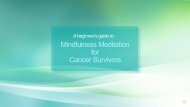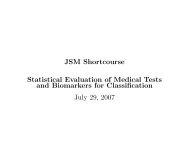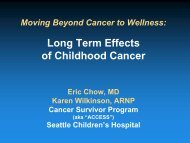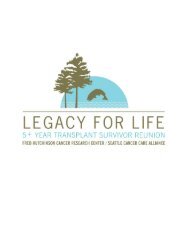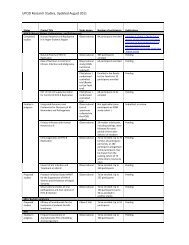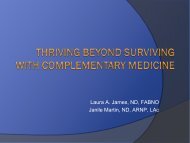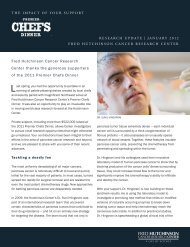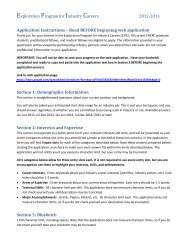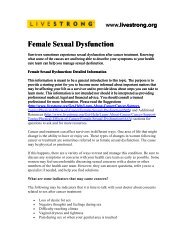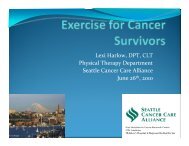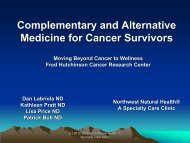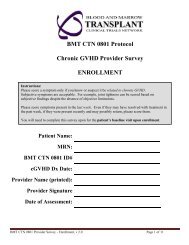Summer Undergraduate Research Program - Fred Hutchinson ...
Summer Undergraduate Research Program - Fred Hutchinson ...
Summer Undergraduate Research Program - Fred Hutchinson ...
Create successful ePaper yourself
Turn your PDF publications into a flip-book with our unique Google optimized e-Paper software.
Beth O'Neil<br />
Director of Admissions and Financial Aid<br />
University of California at Berkeley School of Law (Boalt Hall)<br />
We're trying to gauge the potential for a student's success in law school, and we determine that, principally,<br />
on the basis of what the student has done in the past . The personal statement carries the responsibility of<br />
presenting the student's life experiences .<br />
Applicants make a mistake by doing a lot of speculation about what they're going to do in the future rather<br />
than telling us about what they've done in the past . It is our job to speculate, and we are experienced at that .<br />
Applicants also tend to state and not evaluate . They give a recitation of their experience but no evaluation<br />
of what effect that particular experience had on them, no assessment of what certain experiences or honors<br />
meant .<br />
They also fail to explain errors or weaknesses in their background . Even though we might wish to admit<br />
a student, sometimes we can't in view of a weakness that they haven't made any effort to explain . For<br />
example, perhaps they haven't told us that they were ill on the day that they took the LSAT or had an<br />
automobile accident on the way . Such things are legitimate reasons for poor performance . I mean, we<br />
understand that life is tough sometimes . We need to know what happened, for example, to cause a sudden<br />
drop in the GPA .<br />
Another mistake is that everyone tries to make himself or herself the perfect law school applicant who, of<br />
course, does not exist and is not nearly as interesting as a real human being .<br />
Between l and 5 people read each application .<br />
(Stelzer, p. 72)<br />
Dr. Daniel R. Alonso<br />
Associate Dean for Admissions<br />
Cornell University Medical College<br />
We look for some originality because nine out of ten essays leave you with a big yawn . "I like science,<br />
I like to help people and that's why I want to be a doctor ." The common, uninteresting, and unoriginal<br />
statement is one that recounts the applicant's academic pursuits and basically repeats what is elsewhere<br />
in the application . You look for something different, something that will pique your interest and provide<br />
some very unique insight that will make you pay some notice to this person who is among so many other<br />
qualified applicants. If you're screening 5,500 applications over a four- or six-month period, you want to<br />
see something that's really interesting .<br />
I would simply say: Do it yourself, be careful, edit it, go through as many drafts as necessary . And more<br />
important than anything: be yourself . Really show your<br />
personality . Tell us why you are unique, why we should<br />
admit you . The premise is that 9 out of 10 people who<br />
apply to medical school are very qualified. Don't under any<br />
circumstances insert handwritten work or an unfinished<br />
piece of writing . Do a professional job . I would consider it<br />
a mistake to attempt to cram in too much information, too<br />
many words . Use the space as judiciously as possible . Don't<br />
submit additional pages or use only 1/20th of the space<br />
provided .<br />
(Stelzer, p.81)<br />
20



